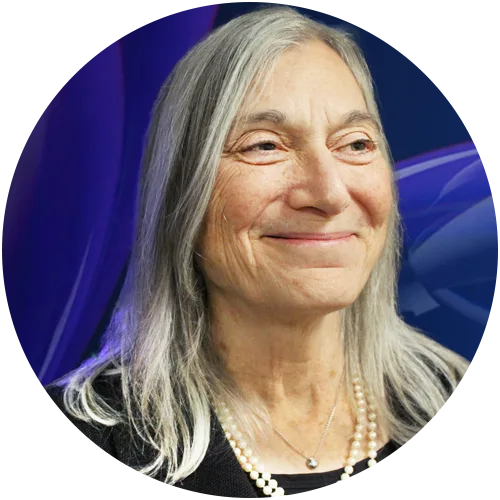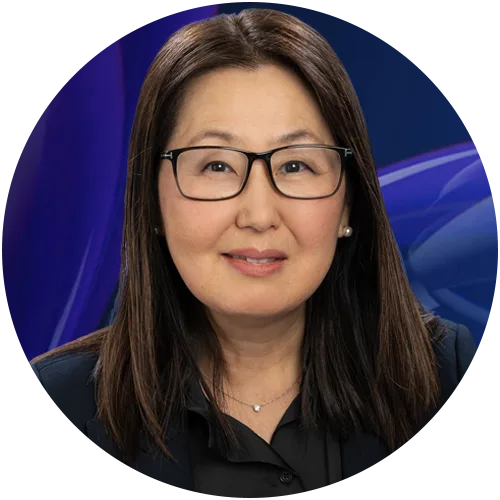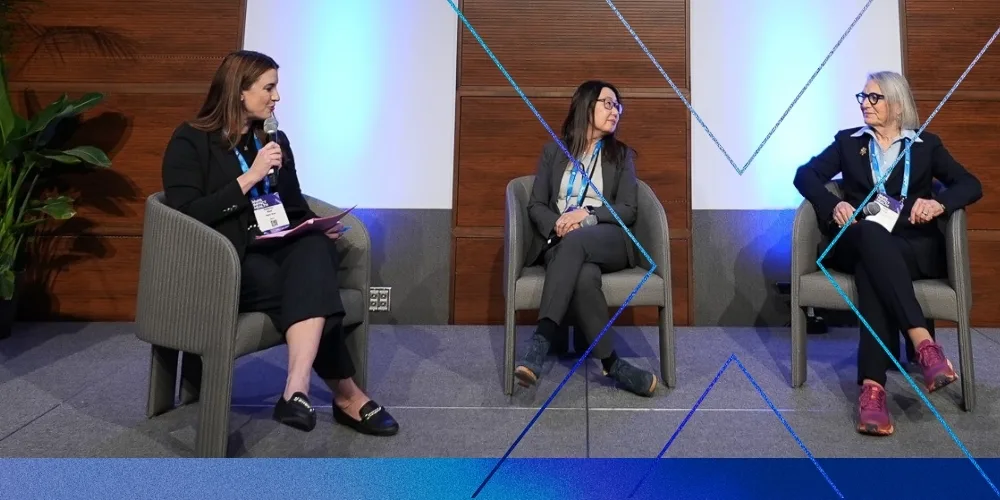It’s different all over: Embracing the complexity of human biology
In this special bonus episode of the MaRS podcast Solve for X, Gillian Einstein and Minna Woo discuss how improving health outcomes for women requires tailored interventions.
By uncovering critical sex-based differences related to brain and metabolic health, researchers Gillian Einstein and Minna Woo are making the case that tailored interventions are key to improving health outcomes for women — and everyone else. Through their work exploring how conditions from Alzheimer’s to kidney disease can have varied effects depending on a patient’s sex, they underscore what the medical community as a whole can learn from experts in women’s health: Things aren’t as simple as we want to believe. In this bonus episode, recorded live on May 8, 2025, at the MaRS Impact Health Conference, Einstein and Woo discuss the complexity of biology, the challenges of funding and why they’re optimistic that things are changing.
Featured in this episode:



Further reading:
- From body to brain: Understanding how sex and gender contribute to brain health as we age
- More women get Alzheimer’s than men. It may not just be because they live longer
- Sleep quality and the menstrual cycle
- Breaking down sex and gender barriers in search of precision medicine
- Canada accelerates diabetes research
Subscribe to Solve for X: Innovations to Change the World here. And below, find a transcript to “It’s different all over.”
NARRATION: Hi, I’m Lara Torvi, a producer at Solve for X: Innovations to Change the World. We’re currently hard at work on the next season of the show, but in the meantime, please enjoy this bonus episode recorded live at the MaRS Impact Health conference last spring.
Gillian Einstein: And when people say to me they’re not studying women or they’re not using female models because they’re too complex, I say to them, “You know, if we had been studying female models all along and somebody came up to us and said we had to start studying males, I would say they’re not complex enough to really give us a good view on the complexity of biology.”
NARRATION: That’s Gilian Einstein. She runs the Einstein Lab of Cognitive Neuroscience, Gender and Health at the University of Toronto. She joined Minna Woo, the director of the Banting and Best Diabetes Centre at U of T, to discuss how tailored interventions are key to improving health outcomes for women. As both of them argue, ignoring gender differences, or worse, defaulting to male models, is just bad science.
Minna Woo: You know, it takes resources, right? It takes resources to do proper trials, to do proper experiments. And basically to do them separately literally means it’s going to cost twice as much. Right? And this is why, you know, you need to invest, right? And this is why some people without the resource have to choose. And unfortunately, the default is male.
NARRATION: Both Gillian and Minna have spent many decades working in medicine. They’ve seen the field’s understanding of gender and sex evolve, but they’ve also actively shaped that understanding. In their research on diseases like Alzheimer’s, diabetes and cancer, they’ve demonstrated time and again how life experience and biology are profoundly intertwined — and affect everybody’s health. Here, recorded live on May 8, 2025, at the MaRS Impact Health conference are Gillian Einstein and Minna Woo, in conversation with journalist Katherine Ward of Global News.
Katherine Ward: Thank you both for joining me here on the stage. We’re talking about precision treatment for women’s health. And it’s a great topic. And in my work as a national journalist, it’s something that comes up time and time again as I speak with scientists from across our country and the amazing work that they do. And that there are differences in how we approach health with regards to a gender lens. And what I always find interesting is that some people are very surprised by this, and other people think, “How can you be surprised by this? This is something that’s been happening for decades?” And I hope that our conversation today sort of shines light on some of those aspects. So to kick us off, I wanted to give both of you the floor to introduce yourselves and talk a little bit more about how you are building a more complete understanding about how sex and gender shapes brain and behaviour, and specifically as it relates to health outcomes for women?
Gillian Einstein: Sure. Delighted. Thank you. I’m Gillian Einstein. I run the Einstein Lab of Cognitive Neuroscience, Gender and Health at the University of Toronto. And the big question in my lab is, why do more women than men have Alzheimer’s disease? It may not surprise this group that at least twice as many women as men have Alzheimer’s disease. And as we know now, Alzheimer’s disease isn’t something that strikes you like a cold. It doesn’t just happen at the age of 68. It starts very early in life. And so what we’re trying to understand in my lab is what are some of the earliest signs of Alzheimer’s disease as it progresses in women who are at early midlife but have had a procedure that actually places them at twice the risk of Alzheimer’s disease and the end of life as women who didn’t have this procedure.
So what is the procedure? It’s ovarian removal. The removal of ovaries before the age of 50 has been shown to lead to a higher all causes of death later in life, and in particular twice the risk of Alzheimer’s disease. So this is an early life event, which I think of as being gendered, because we don’t think too hard about removing the ovaries, whereas we would think pretty hard about removing somebody’s testes, I think.
Now, many of the women do this because they really have no choice. It’s their best move for prolonged life, especially in the case of women who carry the breast cancer mutation, which raises their risk of breast and ovarian cancer.
But at the average age of 42, what we’re finding in our studies is that these women already have cognitive, behavioural and brain signs that are early markers for Alzheimer’s disease. They have a decrement in what we call verbal episodic memory, remembering lists, remembering stories. They have a loss in spatial working memory — like remembering where you parked your car downstairs. And, they also have changes in brain regions. So they have changes in a place called the hippocampus that’s incredibly important for making new memories and it’s one of the earliest sites for Alzheimer’s disease. And we find also that they have disordered sleep, which may be an important place for intervention.
And one of the things that I’ve learned — actually, I’ve learned two very important things. One very important thing is to realize that all menopauses are not created equal. So we say a woman’s in menopause when her ovaries aren’t making a lot of estradiol anymore. The main estrogen made by the ovaries. But in fact, having your ovaries removed prior to the age of 50 runs you a much higher risk of Alzheimer’s disease than if you kept your ovaries for the rest of your life. So those are two very different menopauses. And I actually call these the many menopauses. And I think it’s critical to differentiate why women stop menstruating or stop making estradiol.
The second thing I’ve learned is that it’s so critical in order to get precision treatments, to actually determine what kind of a treatment this person is getting. All estrogens are not created equal. And yet the literature is so unclear on these that we’re not really going to be able to develop precision treatments until we get precise in our language and our thinking about these two really key factors. So, that has really come out in my work, and it’s certainly led me to think of places where innovation would be incredibly important.
Women’s health has led us to what I think is a much more realistic view of biology, which is: biology is complex. You can’t just have one variable and hold everything else constant. And when people say to me they’re not studying women or they’re not using female models because they’re too complex, I say to them, “you know, if we had been studying female models all along and somebody came up to us and said we had to start studying males, I would say they’re not complex enough to really give us a good view on the complexity of biology.”
Katherine Ward: Well, that’s a mic drop moment to start us off, Gillian. Thank you. Minna over to you now. Can you introduce your work uncovering molecular mechanisms that determine pathogenesis of insulin resistance and Type 2 diabetes, which we know increase the risk of cardiovascular related disease and cancer.
Minna Woo: Excellent. Thank you so much. So my name is Minna Woo, and I’m a clinician scientist. I’m an endocrinologist. And the nature of endocrinology, which is the study of hormones. The nature of my practice is predominantly women. So I do a lot of thyroid and diabetes and osteoporosis. And so there’s a lot of women’s health involved.
And you know the facts are until the ’70s and even ’80s, women were actually excluded from studies like in clinical trials. So if you go back and, and, you know, even so, something like in the ’90s, NIH they mandated and then even CIHR. You know, I’ve been in this business now for 25 years. And, you know, when I would write grants to CIHR I don’t recall in the beginning stages, let’s say 25 years ago, but only recently, there’s actually like a sex and gender institute and every grant that we have to write, we have to include how we are, you know, addressing sex and gender issues. And, you know, sometimes even though things should be done and as, as a good scientist, you should, you know, study men and women or females and males separately because we are very, very different biologically. I mean, even if you look at cells in a dish or mice, whether you study mice in females or males, they’re very, very different.
So you know, the human body is incredibly complex and sophisticated, and we find wonderful ways to, you know, compensate so that, you know, everything goes under the radar until they do not. And they then come to the doctor’s office. So for a lot of these conditions, because they present decades after the instigating events or processes, you know, we often have to rely on what we call preclinical models. So we rely on cells or we study mice and transgenic mice. And really here we get to really home in on the mechanistic aspects, because by the time they come with obesity and diabetes and heart disease, you know, a kazillion things have gone awry.
Katherine Ward: I’m wondering, can we go into some examples of ways that your scientific research is shifting to real world applications to help impact women’s health?
Gillian Einstein: Until about two years ago, for far too long I was chair of the advisory committee for the Institute of Gender and Health, which to Canada’s credit is one of the original 13, I believe it’s 13 institutes of the Canadian Institutes of Health Research.
And I watched the Institute of Gender and Health over the years start with gender, actually be about the social influences on males and females and gradually then go over almost entirely to sex differences, which we think about as biological. And now under the current chair, it’s now much more blended into sex and gender, what we’re calling sex and gender science.
And I feel like I had an impact on that. And I think that’s a very important place for us to be going. You know, for a long time we’ve been really strict about saying, OK, sex is biological, it’s genes, it’s hormones, and gender is social. But in fact, you know, the social shapes the biological. And anybody who knows anything about endocrinology will know that the social world shapes what our endocrine system secretes with the stress hormones being the most, prevalently known. But they affect your estradiol and testosterone secretion as well. So I think this blending of sex and gender, if we can figure out the methods that will allow us to study different fields at two such different levels, is actually going to lead to much more precise medicine and much more precise interventions.
Katherine Ward: I mean, have you seen material differences in the last five to 10 years? Are we on the right track? Are people ponying up the money in order to do this right?
Gillian Einstein: I don’t think people are ponying up the money the way it should be. I think a lot of the money, and this is a very important area. A lot of the money in women’s health is really going to women’s reproductive health and especially women’s reproductive health in the global South. And, and, and that’s really important.You know, 50 years ago, being pregnant — it could be a death sentence. You know,childbirth is dangerous. And we’ve solved it for the most part in the global North. So I think it’s important to have a lot of money going there.
But I think there really has to now be a focus where we can have, you know, in places where we can afford to think about it on the rest of the body and the whole body, the brain, the immune system, the cardiac system. We just really need to: It’s different all over.
An area of Alzheimer’s disease is getting very — I mean, it’s very exciting to me in terms of understanding why more women than men have Alzheimer’s disease is looking at the unexpressed X. So for those of you who might not know the X chromosome we carry, women carry two X chromosomes. Females carry two X chromosomes. But we can’t express the second X and it’s random which X chromosome gets silenced and it’s not complete. So in every single cell there’s a little bit of an extra X expression in and that turns out to be really important for health and potentially for women’s risk or resilience to Alzheimer’s disease. So these areas I think are really critical to start exploring and understanding better.
Katherine Ward: And it’s complex.
Gillian Einstein: And it’s complex.
Katherine Ward: How about you Minna, you know, the last five to 10 years, what’s it been like for you in this way?
Minna Woo: You know, when I think back to the days where I would be on call for internship and, and then I think now to all these, you know, wild and wonderful new drugs that we have available today that like the concept didn’t even exist when I went to medical school where I graduated in 1991.
So, so, you know, I think that’s just a testament to what exciting advances that we have made. You know, like HIV and viral hepatitis and, you know, these we would have never considered curable or treatable. And now you know, there are many, many people that are walking around, you know, 30 plus more years because of new discoveries.
But again, with the advances in science, we now have a very, very deeper understanding how not just how women and men present differently, of course. But, you know, the heterogeneity of many of these diseases and, you know, I focus on diabetes, but, you know, how diabetes presents in South Asians versus East Asians versus Blacks versus Indigenous. I mean, we could learn so much. And this is where, you know, precision medicine comes in. And, of course, this applies obviously to women and men as well. So, you know, we’re sort of in an extremely exciting times. You know, maybe I’m a little bit more naive than you are, but I’m very optimistic that we will make headways toward, you know, personalized medicine. But we’re a long ways there. So like, we need to really still understand a lot about these diseases at the deepest level.
Katherine Ward: So as we start to think about winding down this conversation and there’s so much to talk about, but can you both articulate what are some unmet needs as you see them in your respective fields and where you would like to see advancements specifically?
Gillian Einstein: I can hardly wait, and I’m optimistic. So, I would say, first of all, just with respect to the ovaries, I think I would love some smart biophysicist to invent a way to image the ovaries so that we could follow healthy tissue over time and catch cancer early. And, you know, I think the same problems with imaging that happen with the ovaries being deep in the abdomen and hard to, you know, you got I guess you got the heartbeat and a lot of fluids floating around making imaging with a clear image difficult. Same problem for the pancreas, and pancreatic cancer also has this problem. So I would love to see a way to image the ovaries so we could follow them over time.
The other thing I would love to see, and which probably will take AI, is sophisticated statistical methodologies that will allow us to really study complexity and study complexity over a life span so that we can look at somebody early in life with all the intersecting variables of their life experience, as well as their biologies and potentially make predictions about where those might go so that we can keep our eyes open, to what might be happening early when intervention is possible. So for me, those are two very important areas.
The other third place that I think is really important, but I think it’s not at the level of innovation that those are, is that we need better databases. Our studies of those are only as good as the databases and the data that are collected. And if we don’t collect good data about women’s reproductive lives — What if they had an oophorectomy? What kind of hormone therapy they’re on. How many children they had is actually really important. As well as for men, multiple variances and life experiences — we’re not going to get great data out of the databases. So the collection’s really important to me.
Katherine Ward: Minna, over to you.
Minna Woo: Like we’re so siloed. And what we’re realizing is that it’s a little bit more complex. And there’s so much connection and crosstalk between different silos. So as an example, you know, like let’s say neuroscience. And we’re trying to better understand Alzheimer’s disease, you know, neurodegeneration. And this interconnection between neuroscience and immunology. Because of the technology that we have available today, we’re finding things that we would have never imagined before.
This whole notion of being a specialist in one area could sort of be detrimental. And now going forward we have to start talking to people, connecting interdisciplinary. And we gotta start working in teams. Right. And we got to like the engineers and the immunologists and the cell biologists and the doctors. And, you know, we all have to sort of get together to have a holistic understanding As optimistic as I am, we’re so far from really understanding many of these so complex diseases.
Katherine Ward: Complex, team based, AI. Lots to think about. Gillian, Minna, thank you so much for taking the stage day to have this critical conversation. Thank you.
Solve for X is brought to you by MaRS, North America’s largest urban innovation hub.
Gab Harpelle is our mix engineer. Jason McBride is our senior editor. Mack Swain composed our theme song and all the music in this episode; Kathryn Hayward is the executive producer. I’m Lara Torvi filling in this week for our host Manjula Selvarajah. Watch your feed for new episodes coming soon.
And we want to hear from you — drop us a line to share your ideas, questions and feedback. What innovations are you curious about? Email us at media@marsdd.com.
Solve for X is brought to you by MaRS, North America’s largest urban innovation hub and a registered charity. MaRS supports startups and accelerates the adoption of high-impact solutions to some of the world’s biggest challenges. For more information, visit marsdd.com.
Photo illustration: Kelvin Li

 MaRS Staff
MaRS Staff